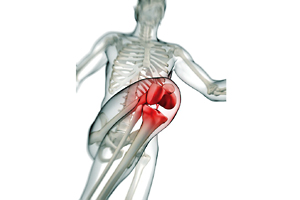Taking NSAIDs For Arthritis Pain Relief? Make Sure You Know The Risks
 You or someone you know well likely suffers from arthritis, joint inflammation that, per the CDC, affects an estimated 54 million people in the United States, or 23% of all adults.1 Two common types of arthritis are osteoarthritis (OA) and rheumatoid arthritis (RA).
You or someone you know well likely suffers from arthritis, joint inflammation that, per the CDC, affects an estimated 54 million people in the United States, or 23% of all adults.1 Two common types of arthritis are osteoarthritis (OA) and rheumatoid arthritis (RA).
Many physicians suggest OA and RA patients take oral NSAIDs (Nonsteroidal anti-inflammatory drugs) such as ibuprofen and naproxen because they have been proven to effectively relieve joint inflammation and pain.2 However, what many people don’t know is that NSAIDs put patients at risk for stomach ulcers — sores on the lining of the stomach caused by stomach acid. As many as 1 in 4 regular NSAID users can develop a GI ulcer.3
“Most people may never even feel the stomach ulcer developing — but stomach ulcers can be very dangerous and lead to serious health complications,” said Amanda E. Nelson M.D., MSCR, Medical Adviser to the Osteoarthritis Action Alliance. “Balanced pain management of arthritis pain symptoms allows for personalized, integrative treatment that might include topical NSAID cream, NSAIDs with a gastroprotectant, physical/occupational therapy or chiropractic care.4
Osteoarthritis is the most common form of arthritis and can affect nearly any joint and occur at any time, starting gradually and worsening over time. Joint pain, stiffness and swelling limit functionality and can affect daily activities.5
Rheumatoid arthritis is an autoimmune disease. This means that the immune system mistakenly attacks healthy cells in the body causing pain and inflammation.6
While every case is unique, and treatment should be decided between a patient and doctor, it’s important to speak to your physician about pain management and the risk of stomach ulcers if you are:
- taking high doses of common NSAIDs;
- have had stomach ulcers in the past;
- combining an NSAID with aspirin (including low-dose aspirin therapy), corticosteroids, or blood thinners; or
- are over 65 years of age.3
“If you meet any of these risk factors, your doctor may suggest you take a medicine that can protect your stomach (a gastroprotective agent) to lower your risk of getting a stomach ulcer,” said Hasan Abed, M.D., board certified anesthesiologist and pain medicine specialist at Advanced Pain Management in Timonium, Maryland. “Speak openly with your physician about your concerns. There are so many aggravating symptoms of arthritis; speak openly with your physician to make sure your treatment is not actually adding to the list of issues!”
For more information, speak with a healthcare professional or visit www.AllianceBPM.org.
References: 1. Centers for Disease Control and Prevention (CDC). Arthritis. https://www.cdc.gov/chronicdisease/resources/publications/factsheets/arthritis.htm. Updated January 30, 2019. Accessed September 9, 2020. 2. Crofford LJ. Use of NSAIDs in treating patients with arthritis. Arthritis Res Ther. 2013;15(suppl 3):S2. 3. Lanza FL, Chan FK, Quigley EM, Practice Parameters Committee of the American College of Gastroenterology. Guidelines for prevention of NSAID-related ulcer complications. Am J Gastroenterol. 2009;104(3):728-738. 4. Alliance for Balanced Pain Management. Why Arthritis Patients Need Balanced Pain Management. https://alliancebpm.org/why-arthritis-patients-need-balanced-pain-management/. Accessed September 9, 2020. 5. Arthritis Foundation. Osteoarthritis. https://www.arthritis.org/diseases/osteoarthritis. Accessed September 9, 2020. 6. Centers for Disease Control and Prevention (CDC). Rheumatoid Arthritis (RA). https://www.cdc.gov/arthritis/basics/rheumatoid-arthritis.html. Updated July 27, 2020. Accessed September 9, 2020.
Article Copyright © BPT 2020 ![]()































